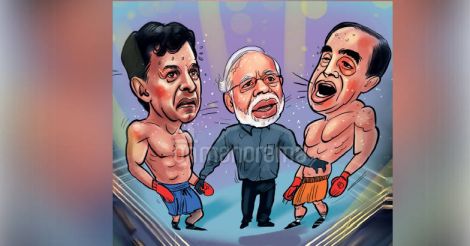The revelation came one fine morning. Reserve Bank of India governor Raghuram Rajan was the sole impediment on India’s path to progress. Subramanian Swamy wanted Rajan to go. Would he step in? a journalist asked. To be fair, Swamy politely refused. He would rather be the finance minister.
This was no joke. Swamy sounded serious. He must have brought up the issue with Narendra Modi, judging by his earlier claim that he had free access to the prime minister. Fortunately, no one took Swamy seriously. The government, in fact, is planning to extend Rajan’s three-year term.
Even the Modi government is into its third year. The heightened aspirations of the business class has dampened. The government has done well in the social services sector but it has failed to enthuse the industry.
The growth rate hovers around 7.5 per cent despite the advantage formed by a slide crude oil prices.
At the same time, inflation has been brought under control and country’s electricity generation has become surplus. The current account deficit has come down to just 1.5 per cent of the gross domestic product.
More impressive was the volume of foreign direct investment. As much as $51 billion, or Rs3.35 lakh crore, inflows were reported in the last financial year up to February. The credit goes to Rajan as well as Modi. The Chicago University professor who predicted the financial crisis of 2008 commands respect in international financial circles. Investors are confident of putting their money into a system with Rajan at the helm. Had Modi heeded Swamy’s counsel and shunted out Rajan, he would have witnessed an unsettling flight of capital.
Swamy was peeved that Rajan has not decreased bank rates or boosted export by devaluing currency. The rupee has fallen nevertheless. The rupee has fallen from 57 against the dollar to 67. 5 during Rajan’s term at the RBI. This augurs well for the exporters but not for the rest of the people.
China, Brazil and Turkey have devalued their currencies but those countries are yet to see any benefit from the move. Devaluing currency could be counterproductive in the long run. The RBI governor has to take into account so many such things.
Export has been going down for the past 20 months. This is one sector which has disappointed those who have been waiting for the ache din as promised by Modi. Commerce minister Nirmala Seetharaman is busy explaining the shortfall. But global trade is slowing down, even in China.
Rajan has received an international award for central banker, while Modi secured a few state honours for himself. Both of them have developed into brands that peg India on the global investment map.

























